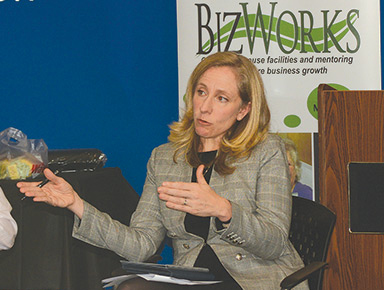
U.S. Rep. Abigail Spanberger came to town Friday, Oct. 11, to talk about the U.S.-Mexico-Canada trade agreement, which is commonly known as USMCA.
The first-term congresswoman met for a roundtable of about 18 citizens and businesspeople at BizWorks, 2545 Bellwood Road.
Spanberger is generally supportive of the agreement, and is focused on how it would impact prescription drugs.
She noted that the Mexican government has approved it and thinks that Canada is basically waiting on U.S. approval. However, Canada has elections later this month, which could complicate things, she said.
Moore Hallmark, executive director of the U.S. Chamber of Commerce’s Southeast region, called USMCA the modernization of the North America Free Trade Agreement that went into effect Jan. 1, 1994. “This is going to be a tough vote for some members,” he said.
Spanberger said that a labor agreement has been reached with Mexico that includes some “pretty significant” changes, but she wonders how it will be enforced.
She noted that she is part of a congressional working group that regularly meets with U.S. Trade Representative Robert Lighthizer, but the group hasn’t seen the details yet.
“Trade agreements create stability, and we need stability for the economy,” she said, adding that the time to pass it is within the next 4-5 weeks.
She didn’t think the impeachment inquiry of President Donald Trump would have much impact on passage of USMCA. If House Speaker Nancy Pelosi brings the bill to the floor, Spanberger believes it will pass.
Spanberger wasn’t sure what impact the agreement would have on steel and wood products, but noted that it would do away with subsidies on Canadian milk, which would make American milk more competitive in Canada.
“Sixteen dairy farms in our district … would benefit pretty substantially,” she said.
Spanberger said the agreement would extend the patent time in Canada, which would impact generic drugs there. “The real (negative) impact is on the Canadian consumer,” she said. The U.S. consumer would then be able to buy drugs from Canada.
Matt McNuss, a 29-year-old attorney with Powell Law Group, wondered if the U.S. economy would go into recession if the USMCA isn’t passed in the next couple of months.
Shane Young, owner of Workspace 101, an office furniture dealer located at the BizWorks site, said the tariffs implemented on China in August of last year have had a positive effect on his two-year-old business.
“I’m happy with the tariffs,” he said. “I can offer a higher-quality product.”
Before the tariffs, 60 percent of the products that his business sold were from China. Now it’s 40 percent, he said. The remainder are from North America: 80 percent from Canada and 20 percent from the U.S., he said.
Young said his business designs, ships and installs furniture products for businesses: small, medium and large. He said his company will sell anywhere from one to 500 chairs to a client and has sold to DuPont, Pepsi, Virginia Farm Bureau, Hopewell Police Department and Richmond city government, for example.
In May, Spanberger spoke out against an additional $200 billion in tariffs on Chinese goods, citing an impact on soybean farmers in her district.
Spanberger – whose district includes all or part of Culpeper, Orange, Louisa, Spotsylvania, Goochland, Amelia, Nottoway, Powhatan, and Henrico counties – also includes part of Chesterfield. In the Village News’ coverage area, Congressional District 7 pulls in much of the county north of Route 288 and Kingsland Road.
One can sign up for updates on her website at spanberger.house.gov.


